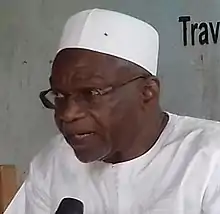2016 Chadian presidential election
Presidential elections were held in Chad on 10 April 2016. Incumbent President Idriss Déby was re-elected for a fifth term.
| |||||||||||||||||||||||||||||||||||
| |||||||||||||||||||||||||||||||||||
| |||||||||||||||||||||||||||||||||||
 |
|---|
|
|
Background
In the electoral system introduced in 1996, the President of Chad is elected to a five-year term using a two-round system, with an absolute majority required to prevent a second round of voting.[1] 23 candidates submitted their applications to run for the presidency. President Idriss Déby ran for a fifth term in office and was expected to win.[2] One of the opposition's most prominent members, Ngarlejy Yorongar, was prevented from running due to administrative irregularities.[3]
Conduct
Chad's opposition led a large-scale nationwide shutdown on 24 February 2016 to protest Déby's continuing 26-year tenure. The nationwide strike brought many of Chad's towns and the capital N'Djamena to a halt with markets, schools, transport, district centers and various operations shut down. It was the sixth major protest against Déby since the beginning of the year and various residents in N'Djamena claimed that it was the largest protest ever against the President.[4] The campaign was run under the slogan "Ça Suffit", French for "That's enough".[5]
On the day of the election mobile internet, fixed internet connections and SMS messaging were cut. Furthermore, many foreign TV operators could not cover the post election scene as their filming licenses were not renewed.[6] French broadcaster, TV5Monde had their equipment confiscated and their crew were held for several hours for filming at a polling station.[7]
Results
Results announced by the electoral commission on 21 April 2016 showed Déby winning in the first round of voting with 61.56% of the vote. All of the other candidates trailed far behind. Long-time opposition leader Saleh Kebzabo, who placed second, was credited with 12.80% of the vote.[8]
The Constitutional Council validated the results on 4 May 2016, dismissing a joint appeal from opposition candidates, who alleged irregularities, on the technical grounds that it could not review appeals submitted jointly. The final results issued by the court showed Déby with 59.92% of the vote and Kebzabo with 12.77%.[9]
| Candidate | Party | Votes | % | |
|---|---|---|---|---|
| Idriss Déby | Patriotic Salvation Movement | 2,219,352 | 59.92 | |
| Saleh Kebzabo | National Union for Democracy and Renewal | 473,074 | 12.77 | |
| Laoukein Kourayo Médard | Chadian Convention for Peace and Development | 392,988 | 10.61 | |
| Djimrangar Dadnadji | CAP–SUR | 186,857 | 5.04 | |
| Delwa Kassiré Koumakoye | 73,636 | 1.99 | ||
| Malloum Yoboide Djeraki | 67,019 | 1.81 | ||
| Mahamat Ahmad Alhabo | 58,533 | 1.58 | ||
| Abdoulaye Mbodou Mbami | 53,204 | 1.44 | ||
| Clément Djimet Bagaou | 48,471 | 1.31 | ||
| Gali Gatta Ngothé | 44,899 | 1.21 | ||
| Brice Mbaimon Guedmbaye | 36,647 | 0.99 | ||
| Beassoumda Julien | 24,125 | 0.65 | ||
| Djividi Boukar | 25,107 | 0.68 | ||
| Total | 3,703,912 | 100.00 | ||
| Valid votes | 3,703,912 | 89.82 | ||
| Invalid/blank votes | 419,818 | 10.18 | ||
| Total votes | 4,123,730 | 100.00 | ||
| Registered voters/turnout | 6,252,548 | 65.95 | ||
| Source: Constitutional Court | ||||
Déby was sworn in for his new term on 8 August 2016 at a ceremony in N'Djamena.[10]
Reactions
The African Union, of which Déby is the current chairperson, declared that the election was carried out "without fraud" despite various discrepancies in the electoral process.[11] The report stated that various polling station staff were under-trained and of all the ballot boxes observed, 81% of the ballot boxes were not checked to see if they were empty at the start of the polling. Furthermore, 10% of the polling stations did not provide secrecy in voting; however, the elections were peaceful and concluded fairly.[12]
Runner-up Saleh Kebzabo refused to accept the outcome of the vote, stating that it was an "electoral stick-up." Other opposition politicians cite alleged ballot irregularities, including the disappearance of boxes and stuffing.[13][14]
References
- "Chad: Election for President". International Foundation for Electoral Systems. Retrieved 23 April 2016.
- "Chad: 23 candidates file to contest April presidential election". Africanews. Retrieved 5 April 2016.
- "Tchad: les explications du rejet de la candidature de Yorongar Ngarlejy" (in French). Radio France Internationale. Retrieved 23 April 2016.
- "Chad: 'Fed Up' Chadians Shut Down Capital". AllAfrica. Retrieved 5 April 2015.
- Stephane Yas; Jean-Pierre Campagne (28 February 2016). "Chad leader facing biggest protests of his long rule". ReliefWeb. Retrieved 5 April 2016.
- "Internet remains cut in Chad after tense elections". The Citizen. Archived from the original on 28 April 2016. Retrieved 13 April 2016.
- "TV5 Monde blocked from covering Chad's presidential election". Africanews. Retrieved 13 April 2016.
- "Chadian President Deby re-elected in landslide first-round victory". Reuters. 21 April 2016. Retrieved 23 April 2016.
- "Chad constitutional council upholds Deby re-election" Archived 2017-11-14 at the Wayback Machine, Agence France-Presse, 4 May 2016.
- Stephane Yas and Samir Tounsi, "Tensions in Chad as Deby sworn in for fifth term", Agence France-Presse, 8 August 2016.
- "African Union: Chad polls free and without fraud despite anomalies". Africanews. Retrieved 13 April 2016.
- "African Union happy with Chad polls". Daily Nation. Retrieved 13 April 2016.
- "Chad's President Idriss Deby wins fifth term". BBC News. Retrieved 23 April 2016.
- "Incumbent Chadian President Wins Fifth Term Amid Fraud Allegations". Voice Of America. Archived from the original on 23 April 2016. Retrieved 23 April 2016.

